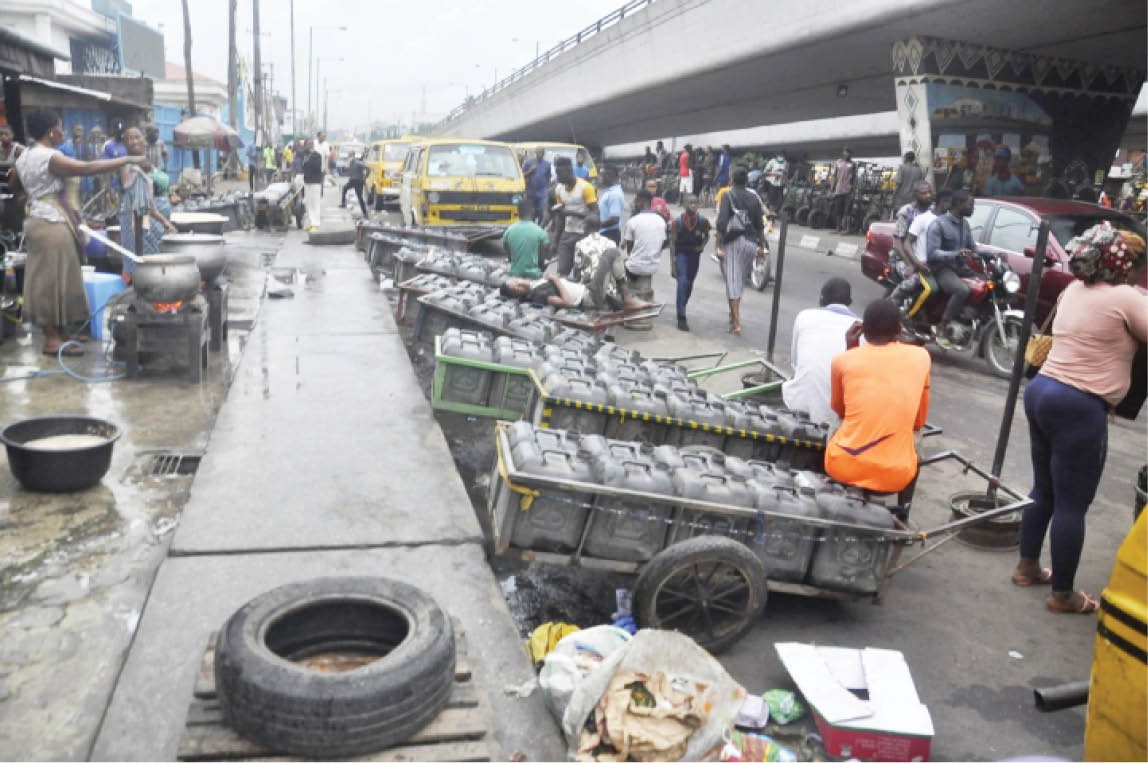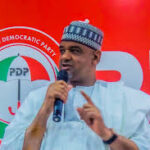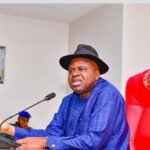The lack of accessible, reliable and safe drinking water, together with poor sanitation and hygiene, is estimated to cost Nigeria about $1.3 billion in access time, loss due to premature death, productive time loss and health care costs.
Why is this happening in a country with abundant water resources? Nigeria is so rich in water resources that many of its 36 states are named after rivers but 3 in 10 people still lack access to clean water despite the existence of water boards in all the states in the country. Daily Trust reports
Bayelsa State is surrounded by water but virtually all the eight local government areas of the state are faced with the challenges of accessing potable water supply.
- Samson Gbadebo: Adeleke, Noble, Iwuala’s invitation to Super Eagles is morale booster
- Kwankwaso to Ganduje: Kano people need education more than flyovers
The state water corporation is not functioning at the moment, thereby depriving the residents of Yenagoa, the state capital, access to the public water supply. Though the state government through the Ministry of Water Resources has constantly promised to restore the public water supply, nothing concrete has been done.
Residents in Yenagoa, the state capital, which is the major urban area of the state, and other places of interest including local government headquarters and villages, both in coastal and upland areas, are accessing potable water from the streams and boreholes.
The state water corporation located in Okaka community is not dispensing water to the public, claiming that the road construction work during the administration of Chief Henry Seriake Dickson had destroyed some water pipes.
In what seems like the effort by the state government to bring back public water supply in Bayelsa State and reactivate the State Water Corporation, Bayelsa State Governor Douye Diri reiterated his resolve to the provision of adequate water supply to residents of the state.
Hon. Keme Wariebi, the Commissioner for Water Resources, said this during a water test run tour to the Okaka community recently.
Wariebi said the intervention of the administration in the rehabilitation of the public water system in the state will also prevent waterborne diseases.
According to him, the rehabilitation work going on at the water board at Okaka and Ovom will increase its daily output of about 70 percent.
“We now have new equipment such as pumping machines, filters, filters control, transformers, low and high lift pump among others. This equipment will assist our daily water output supply.
“I urge the residents to protect government utilities from vandals so as to complement the state government’s effort in providing portable drinking water,” he said.
A resident of Yenagoa, Preye Iniefe, told Daily Trust Saturday that there was a public water supply in the state in 1999 during the administration of the first civilian governor, late Chief Diepreye Alamieyesigha, and other subsequent administrations when the state water corporation was working until 2012 when the immediate past governor, Senator Henry Seriake Dickson, carried out some road constructions and the water pipes were destroyed.
He said: “There is nothing we can do; we are in Nigeria, a country where citizens are expected to provide basic amenities for themselves. In Bayelsa State, we provide power, water, and even roads for ourselves. All the government is doing is to collect taxes.
“Recently the state House of Assembly even came out with the bill that all those that have boreholes in their houses will be taxed; imagine such funny things. So if the government cannot provide water for its citizens, is it wrong for citizens to look for alternatives?
“As I am talking to you, Bayelsa State Water Company is not working; the local streams from where people used to get drinking water for themselves are being polluted with oil exploration by the multinational, so we are left to fend for ourselves.”
According to him, the situation has led to many residents suffering from water-borne diseases and other ailments.
“Just observe the tanks we are taking water from; you will see they are all rusty. How can you get good water from there? The situation is pathetic and the government seems not to be bothered about it,” he said.
Checks around Yenagoa, the state capital, indicate that 20 litres jerrican of water by vendors is sold at the cost of N40 to N50 while the borehole operators sell the 20 litres of water at the cost of N20 directly to residents who may not want to engage the services of vendors when there is no public power supply and when there is a power supply, it costs N10. However, experts warned that the water in those boreholes is not good for drinking because of the iron in it.

No water in Rivers
The Rivers State Water Corporation located at waterworks road, Rumola, has remained dormant for years.
Residents of Port Harcourt and its suburbs, our reporter learnt, depend on private boreholes as a means of getting their daily water supply.
The few public taps located at the strategic parts of Port Harcourt are obsolete.
Worried by the dormant nature of the corporation, Rivers State Governor, Nyesom Wike, in 2018, inaugurated the Port Harcourt Water Corporation in a move to develop a new water supply chain for Port Harcourt and Obio/Akpor local government areas of the state.
The governor while inaugurating the water corporation board at the Government House, Port Harcourt, urged the members to ensure that water flows to homes in the state capital.
“I want to advise the Port Harcourt Water Corporation to work in unity, to ensure water flows to homes for the first time in decades.
A staff member of the corporation who spoke with our reporter under the condition of anonymity said that the office has remained dormant because the state has no active functional public tap.
“As we speak, this place has not been effectively functional because we don’t have much to do. There is no public tap in the state. All the residents rely on boreholes to take care of their daily water needs. During Amaechi’s administration, there was a collaboration between the state government and the World Bank to initiate water projects across the state but that project did not work because the then state could not get all the necessary support from the government at the centre because of the strained relationship between Jonathan and Amaechi,” he said.
Our reporter learnt that the State Commissioner for Water Resources, Dr Tamunosisi Gogo Jaja, recently directed all the users of the borehole as well as the operators of the borehole in the state to register with the ministry to ensure regulation of borehole usage in the state.
Edo state water board moribund
In Edo State, the state water board is moribund as there is no pipe-borne water from the state water corporation both at the state capital, Benin City, and other parts of the state.
Residents depend on individual boreholes to get water for use.
It was gathered that staff of the
state water board are redundant as they only sit in their office since the board is not functioning.
A staff member of the board, who spoke to our correspondent on the condition of anonymity, said they only come to the office and sit down since they virtually have no work to do.
“We are only coming to office because we are staff but we can’t function optimally, as there is no more pipe-borne water.
“But, we heard that the governor is making preparation to resuscitate it,” he said.
A resident, Mr Osaremen Osahon, lamented the pathetic situation.
“I can’t recollect when water from the state water board rushed into the state. Former governor Adams Oshiomhole bought water drilling machines to provide boreholes across the state but they couldn’t sink one borehole.
“If you go to the water board now, the workers are sitting idle in their offices because they have no work to do,” he said.
Another resident who called his name Abu Jimoh, noted that the state water board is not existing in the state.
He said, “What we have in Benin is a private water board and everybody provides water for him or herself. A can of water is N20 from the private borehole.”
Our correspondent could not get a response from the authority, as the state government is yet to appoint commissioners.

Boreholes to the rescue in Lagos
An adequate supply of public portable water to the homes of Lagosians has remained a challenge as many homes rely on boreholes.
Those who cannot afford to drill boreholes rely on water from shallow wells and water vendors due to lack of treated public water.
This has been the situation in many parts of the state including Abule Egba, Ikorodu, Mafoluku, Oshodi, Agege, Egbeda, Ejigbo, Surulere and Ipaja among others.
Although the Lagos State Water Corporation said it supplies water to parts of Lagos Island, Mainland, Festac, Ikeja, Iyana Ipaja, Oshodi, Victoria Island and Lekki among others.
According to the spokesperson of Lagos Water Corporation, Anifowose Rasaq, the corporation presently supplies 210million gallons of water per day, which is far below the 540million gallons demand for water per day in Lagos.
Rasaq blamed the inadequate supply of water on the explosive population in the state. He also identified poor power supply and ageing infrastructure as challenges impeding the supply of water to the people.
“We have issues with leakages from burst pipes. The maintenance culture of the people is poor as they burst pipes in a bid to get water at all cost. Also, Lagosians don’t want to pay; they want free water, not knowing that waterworks and supplying water to homes are capital intensive,” he lamented.
He however disclosed that the ongoing Adiyan water work phase two is at 85percent completion level; assuring that once completed, it would provide additional 70million gallons per day.
“The current administration of Governor Babajide Sanwo-Olu is committed to meeting the water needs of the people,” he said.
Some Lagosians have also decried disconnection of their water pipes due to road construction works; alleging failure to reconnect them after the construction works.
Residents along the Lagos/Abeokuta expressway said the rehabilitation of the expressway over two years ago led to disconnection of their water pipes and that they had since then been left without access to potable water.
In some areas, people especially women and children, travel far distances in search of water and, in some cases, queue to fetch water from houses where boreholes are available.
Water supply restored in Abakaliki
In Ebonyi, the state government has restored water supply in some parts of the state capital, Abakaliki, after years of skeletal services.
Those attached with the new water pump line originating from Oferekpe water scheme are excluded from the recent supply.
The absence of water supply however has a minor effect on the residents whose alternative relied on well-water, boreholes, and public water supply systems.
The public water system was popularly referred to as hand pumps which were provided through the state agencies in partnership with some foreign organisations; Rural Water Supply and Sanitation Agency, RUWASSA, United States Agency for International Development, USAID.
However, the public pumps which traditionally were mostly sited in rural areas are under the purview of the local government in assuring constant maintenance and repair in case of damage.
At the moment, the administration of Governor David Umahi established the Ministry of Water Resources in 2015 to cushion the effect of water supply in the state.
Abia seeks restoration
Leo Ogbonna, the General Manager of Abia State Water Board and Sewage Corporation, said the board has embarked on a large-scale programme of rehabilitation of the state’s regional water schemes in the two municipalities of Aba and Umuahia as well as neighbouring communities.
Starting with the first phase of the Umuahia Regional Water Scheme which was moribund for over 14 years, he said the board has moved on to the second phase of upgrading the capacity of the scheme so that it could serve the outskirts of the Umuahia municipality, like the Ohiya Mechanic Village, Industrial Market at Ahiaeke and nearby communities.
Ogbonna disclosed further that to achieve the goal of putting water in every home, the board has designed the pumping statistics to be three times per week due to the cost of production.
The new helmsman of the Abia Water Board has also directed energy towards revamping the rural water schemes. In Abia, there are fifty-seven existing rural water schemes cut across the seventeen local councils but have been moribund for over fifteen years.
“I did a pilot sampling with four rural water schemes. I did the rehabilitation of four out of the fifty-seven existing schemes in the first two months of my assumption in office,” he said.
Christiana T. Alabi (Lagos), Nabob Ogbonna (Abakiliki), Bassey Willie (Yenagoa), Victor Edozie (Port Harcourt), Usman A. Bello (Benin) & Linus Effiong (Umuahia)

 Join Daily Trust WhatsApp Community For Quick Access To News and Happenings Around You.
Join Daily Trust WhatsApp Community For Quick Access To News and Happenings Around You.


